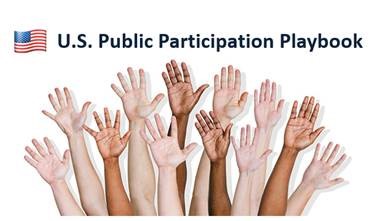
 We conclude the 10th Sunshine Week celebrations with an update on the Open Government Initiative started six years ago by President Obama. As part of the Initiative, U.S. agencies are increasingly adopting a “default to open” approach, making more information, data, and records available online than ever before. This week, the Federal government also launched the first government-wide public analytics web dashboard, which is hosted by the General Services Administration (GSA) at analytics.usa.gov.
We conclude the 10th Sunshine Week celebrations with an update on the Open Government Initiative started six years ago by President Obama. As part of the Initiative, U.S. agencies are increasingly adopting a “default to open” approach, making more information, data, and records available online than ever before. This week, the Federal government also launched the first government-wide public analytics web dashboard, which is hosted by the General Services Administration (GSA) at analytics.usa.gov.
 Sunshine Week is always celebrated during the birthday week of our nation’s fourth President James Madison because of President Madison’s belief and leadership in open government. Today we are proud that the United States remains a leader of global open government efforts, including working closely with governments and civil society organizations around the world through the Open Government Partnership (OGP) and issuing Open Government National Action Plans to detail our own open-government efforts.
Sunshine Week is always celebrated during the birthday week of our nation’s fourth President James Madison because of President Madison’s belief and leadership in open government. Today we are proud that the United States remains a leader of global open government efforts, including working closely with governments and civil society organizations around the world through the Open Government Partnership (OGP) and issuing Open Government National Action Plans to detail our own open-government efforts.
As part of Sunshine Week, the White House held an Open Government Workshop (OGW) to kick off the development of the third Open Government National Action Plan (NAP3.0), which is scheduled for release in October 2015, and highlight achievements from the NAP’s first and second iterations (NAP 1.0 and 2.0). This week, the White House also issued a report detailing progress on implementing NAP 2.0. Implementation of NAP 2.0 will continue through December 2015.

Sunshine Week highlighted the truly all-hands-on-deck effort that is open government. Key open government achievements in the U.S. include:
-
The Public Participation Playbook, a toolkit that agencies can use to enhance their public engagement. The Playbook was co-created and launched by a team of more than 70 professionals from more than 30 agencies, working openly with a dozen members of civil society. This effort, which was included in both NAP 1.0 and NAP 2.0, is not only being successfully implemented by U.S. agencies, but is also attracting interest from governments around the world.

-
We the People, an online site that allows the public to open and sign petitions on issues that matter to them. Since 2011, more than 18 million users have signed nearly 400,000 petitions through this site, which was included in both NAP 1.0 and 2.0.

-
The entry of the United States into the Extractive Industries Transparency Initiative, in fulfillment of a commitment in the NAP 2.0. During Sunshine Week, the team leading that work demonstrated the newly launched site where the United States is publicly tracking revenues received for our country’s natural resources. The site is entirely open source and available for anyone to reuse, including other countries that are working on natural resources transparency.

Sunshine Week also provided an opportunity to hear about ways in which the United States is leading by example to encourage adoption of open government practices worldwide. Having partnered with seven other countries to launch OGP, the U.S. continues to work with and through multilateral, civil society, and private sector partners to encourage and support our partners in promoting their open government agendas and encouraging citizen engagement.
For instance, the U.S. worked closely with Sierra Leone’s open government initiative to allow citizens to report information about Ebola via text messaging and voice calls, helping the government of Sierra Leone better track and combat the Ebola epidemic. The U.S. is also providing assistance to help Tunisia and number of other countries use open government implement their democratic transitions.
At the OGW, representatives of U.S. agencies and civil society organizations worked together to brainstorm ideas on open government topics ranging from fiscal transparency, public participation, the Freedom of Information Act, open data, open innovation, and Federal and local collaboration, while members of the public who were not present at the workshop contributed ideas via Twitter. Over the coming months, we will incorporate these suggestions into new U.S. commitments under the NAP 3.0.
As we continue our work, we want to hear your ideas. Email them to us at opengov@ostp.gov, tweet them to us at @OpenGov, and keep an eye out for more opportunities for online and in-person collaboration.
Megan Smith is U.S. Chief Technology Officer at the White House Office of Science and Technology Policy and Assistant to the President.
Gayle Smith is a Special Assistant to the President and Senior Director at the National Security Council.


